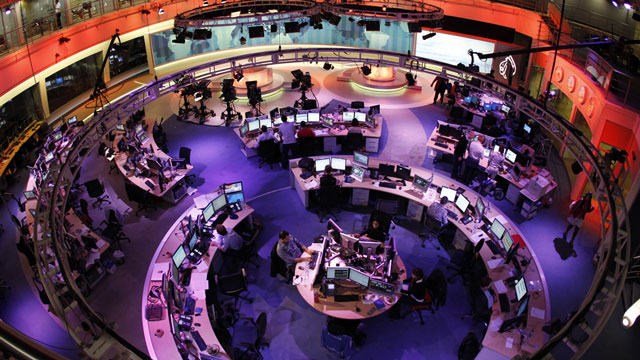
Al Jazeera charts digital course through choppy waters
Baca Juga

Doha, Qatar | AFP | Qatar-based broadcaster Al Jazeera has travelled a long and bumpy road from the early 2000s when it was best known for airing tapes of former Al-Qaeda leader Osama bin Laden.
It now cultivates a loyal youth audience on social media alongside the satellite channels which have won it both acclaim and scorn.
But it faces twin existential threats — targeted by regional power Saudi Arabia which demands its closure, and with the credibility of its digital expansion questioned by social media labelling its output state-controlled.
Al Jazeera’s boss Mostefa Souag still has a cassette player in his office, though he foresees a future dominated by viral clips, animation and interactivity.
“When people start talking about Al Jazeera and all the criticism, I say why don’t you watch it,” Souag said as his eyes darted across screens displaying its programmes.
The Arabic channel, the first to launch, revolutionised Middle Eastern news — broadcasting programmes about social issues, taboos and politics to an audience previously offered only staid state television.
But it has drawn the ire of regional rulers from Rabat to Riyadh for allegedly fomenting unrest — a charge managers deny.
Satellite news remains the heart of its operations, but an army of fashionable twenty-somethings also create GIFs, animations and short films purely for digital consumption, branded AJ+.
“We have the values of Al Jazeera, but we are the cool millennial version,” said AJ+ managing director Dima Khatib, leader of the online expansion.
AJ+’s Doha base is more trendy tech startup than newsroom, complete with exposed brick-work and Apple computers.
Its Facebook page has 11 million followers.
But Facebook notified Al Jazeera late last year it would be tagged as “state-controlled” as part of the Silicon Valley giant’s response to fake news.
Al Jazeera has strongly objected, arguing that just because Qatari authorities pay its bills does not mean they exert undue influence.
Though Al Jazeera’s YouTube output is already tagged Qatari-funded, executives expressed fears the new move would be a major blow to its credibility and the position of its journalists.
“Its regional adversaries will, moreover, clearly seek to weaponise this labelling as part of their ongoing campaign to silence the network,” Al Jazeera said in a legal letter to Facebook seen by AFP.
– Demands for shutdown –
“Nobody from the government is allowed to communicate with Al Jazeera on any editorial issue,” said Souag forcefully.
The network denies it fails to report critically on Qatar, insisting it covers controversies including workers’ rights, a topic which human rights groups have repeatedly zeroed in on during the frenzy of building activity ahead of the 2022 World Cup.
But Mona Elswah, an Arab media researcher at the Oxford Internet Institute, said its Arabic channel had become a “mouthpiece for the Qatari government”.
“If the government changes its position, Al Jazeera would have to change its position no matter what,” she told AFP.
The network is also central to a dispute between Doha and its regional rivals led by Riyadh.
Together with the United Arab Emirates, Bahrain and Egypt, Saudi Arabia cut bilateral ties with Qatar in June 2017 and launched an economic blockade, accusing it of supporting radical Islamist groups and Iran — which Doha refutes.
These powers issued 13 demands — including Al Jazeera’s closure.
Souag, 74, said that despite signs of a thaw between Qatar and the Saudi-led boycotters, he is confident the broadcaster would never be sacrificed for the cause of reconciliation.
Globally, Al Jazeera operates hubs in Doha, Kuala Lumpur, London and Washington, with bureaus in more than 70 countries and a workforce of 3,500 to 4,000.
In Souag’s office, an Al Jazeera-branded bulletproof helmet is prominently displayed, a stark reminder of the risks facing crews.
Since the Arabic channel’s launch in 1996, followed by English in 2006 and Serbo-Croat in 2011, several staff have been killed or wounded, while some field offices have been shuttered by authorities.
– Platform to Arab Spring protests –
Despite drawing the ire of governments in the region and beyond, Al Jazeera remains popular, and accessible to 410 million homes, according to its own data.
Elswah suggested its influence had waned in the Middle East though because of the boycott.
The English channel is seen as less political, and controversial, than its Arabic stablemate, but journalists from both arms have been caught up in wrangles.
Producer Mahmoud Hussein was arrested during a personal visit to Cairo in December 2016 and charged with crimes against Egypt.
Hussein, who remains in detention, became emblematic of the rift between Cairo and Doha following the Egyptian army’s ouster of Islamist president Mohamed Morsi, who was backed by Qatar.
Cairo, and other governments facing protests, criticised Al Jazeera for giving a platform to demonstrators and chronicling the 2011 Arab Spring movements across the region.
But soon after, critics say it shed its impartial role and began advocating for policies aligned to Qatar, costing it audiences and credibility, especially on the Arabic channel.
The post Al Jazeera charts digital course through choppy waters appeared first on The Independent Uganda:.

0 Response to "Al Jazeera charts digital course through choppy waters"
Post a Comment